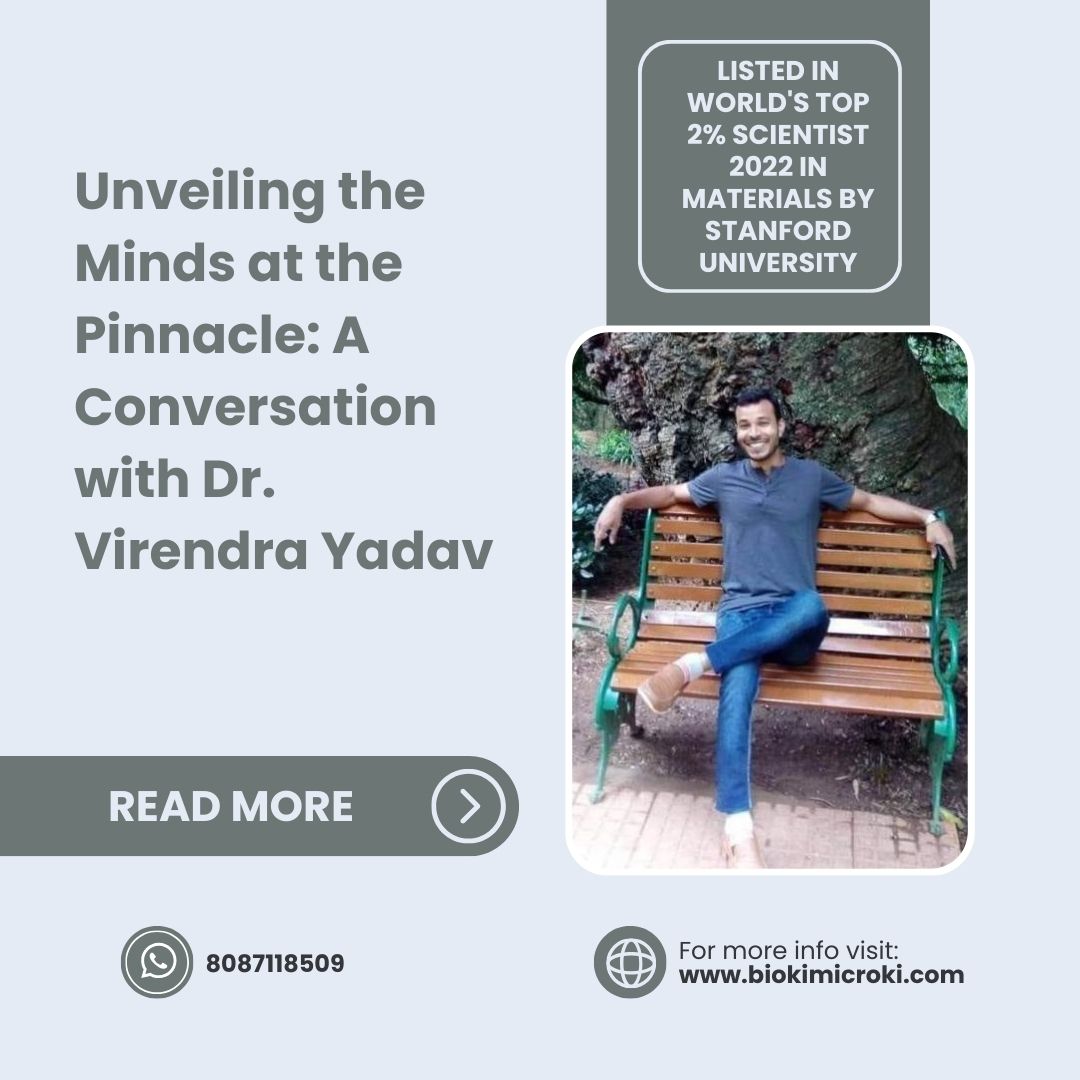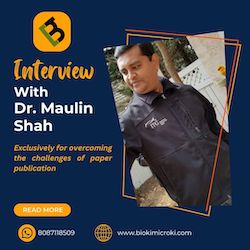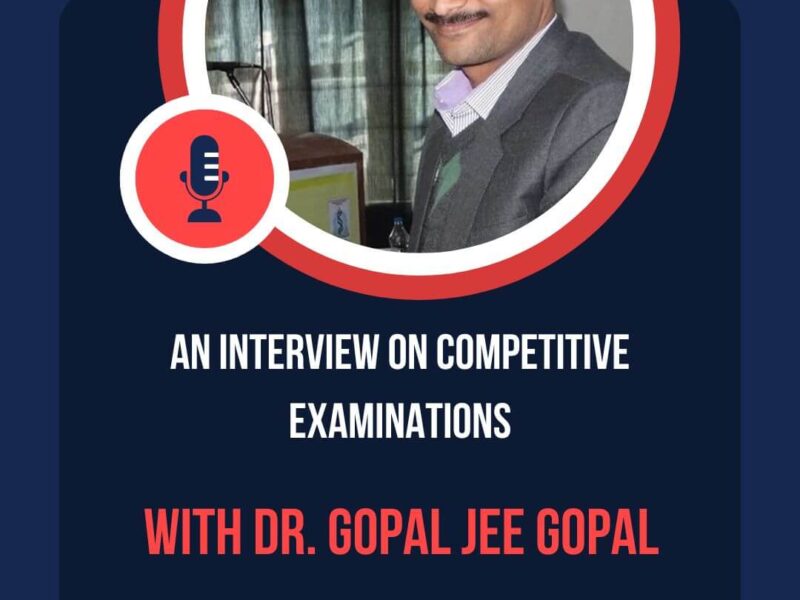“An Interview with Dr. Virendra Yadav, who has been Listed World’s Top 2% Scientist 2022 in Materials by Stanford University.“
Dear Readers,
I am Sana and I welcome you today for yet another insightful interview with an eminent Researcher. As you all know, we at BiokiMicroki aim to bring forth the views & opinions of renowned professionals across the domain of Life Sciences. And it is with this aim and your beloved readership that we strive to bring in as many eminent personalities as we can.
So, without further ado, I would like to bring forth the interview with one such eminent professional. Today we have with us Dr. Virendra Yadav, a subject expert from Microbiology and Environment Science field who is a Researcher and an accomplished Professional. We are very proud to share that Dr. Virendra Yadav has been enlisted in top 2% Scientists of the World. From my team I would like to thank Dr. Virendra Yadav for accepting our request and sharing his knowledge and inspirational story with us.
Brief Profile of Dr. Virendra Yadav –
Dr. Yadav is currently working as a Research associate in the Department of Lifesciences, Hemchandracharya North Gujarat University, Patan. He has more than 5 years of teaching and research experience. He has published more than 155 articles, 11 patents (two granted), and many more. He has completed his B.Sc. (H) in microbiology from Delhi University, M.Sc. in microbiology from HNB Garhwal University, M. Phil, and Ph.D. in Nanosciences from the Central University of Gujarat.
https://www.researchgate.net/profile/Virendra-Yadav
Google Scholar Profile
Sir, you have been in this domain for a long time and it would be great to receive your pearls of wisdom. Firstly, we would like to congratulate you for being enlisted in the top 2% Scientists of the World.
Sana: And so my first question is the most obvious question that many of our readers are eager to know: Getting enlisted in top 2% Scientists is a huge achievement, what do you feel about it? What were your initial reactions when you got the news?
Dr. Virendra Yadav: I am very happy about this. I was not expecting my name for this but I was sure about 2024 or 2025 as they take the last 5 years average data of citations.
Sana: Many of us aren’t really aware about this process of being enlisted in the 2% Scientists of the world. Could you tell us a bit about it? About the process and how it all transpires?
Dr. Virendra Yadav: We don’t have to do anything separately. The only thing is the researcher must have a Google Scholar account. If his/her work is continuously read by other researchers and gets cited so, there is a possibility of getting named in this list.
Sana: What has motivated you to pursue your career in Research?
Dr. Virendra Yadav: Well, I never wanted to be in the teaching or research field. But yes, I wanted to be a scientist from childhood which was against my family. They wanted to see me as a doctor by profession. So, even I also don’t know how I am in this field?
Sana: Now, this leads to how do you define Research as and what’s the need for it in a constantly changing world? What is Research and why do we need to conduct Research?
Dr. Virendra Yadav: Research is one of the important aspects in today’s world in academia. Now all the universities have made it mandatory and most of the universities are recruiting separate research faculty in India too. According to me, a researcher is not a special person or scientist. Almost everyone is a researcher. Everyone is an innovator. But hardly a few of them put them in front of the public domain. Some of the innovations are done by farmers in India, housewives, a school going students as you can find on the Indian patent website like Ulta Chhata, multi-player Chessboard, etc.. So according to everyone are doing research knowingly and unknowingly.
In academia, research is very important specifically to be competitive in this field.
Sana: What is most interesting part of Research as a career?
Dr. Virendra Yadav: Sorry. I won’t be able to answer it perfectly. It could vary from one researcher to another, like in Europe and Southeast Asia, China, Taiwan, and Saudi Arabia a researcher is paid a handsome salary. In addition to this, they are paid an incentive for each publication. So, according to me, it is a good choice as a career along with name and fame. But at the same time, you have the pressure to publish articles in high-impact journals within the deadline which is the other dark side of this field.
In a country like India, more infrastructures are required in terms of funding, instruments, etc. then only we can compete with the technologically advanced countries in the world.
Sana: Is a Ph.D necessary to pursue career in research?
Dr. Virendra Yadav: I guess I have already answered this question. As I told you most of the innovations in India are filed by farmers and school students who know their mother tongue. So, for research, neither foreign language, no formal education is required…. Let me give some more examples where patents have been granted to farmers and students.
- Trickle Irrigation Emitter by farmer of Pune
- a six-player variant of chess: at the age of 9 by Hridayeshwar Singh Bhati…
Sana: What skills are a must-have to be a researcher?
Dr. Virendra Yadav: patience, dedication, consistency and self-belief. There will be ups and downs. Every day is not yours. Someday your experiment will be successful and you will get the result while something will fail and you will get disappointed. Sometimes your article will be rejected more than 10 times, but as I said keep patience and have faith. Sometimes you will be criticized by your colleagues, neighbors, and society, and believe they will also be the first to appreciate you once you get recognition and success.
In the end, all these things will make you a stronger person firstly and a good researcher secondly.
Sana: How one can discover his or her interest in research?
Dr. Virendra Yadav: Again, it could vary from person to person. Sometimes one has a passion for the research they perform the research at their own expense without any support. We have several examples from our history while someone leaves the country in lack of support. So, it could vary from person to person, what drives them in research weather, whether it’s money, recognition, or something else.
Sana: What is the difference between research conducted in Universities and Research Institutes?
Dr. Virendra Yadav: According to me both are the same but I think research institutes have more research facilities like CSIR, ICMR, ICAR, etc. All these centrally funded laboratories have state of art laboratories for conducting research. Whereas universities like state or private ones don’t have sophisticated instruments due to their high maintenance cost.
Sana: How should one decide whether to pursue his/her research in a University or in a Research Institute? What are the pros and cons of both?
Dr. Virendra Yadav: I guess I have already answered the above question. Both have their pros and cons. However, according to me, research institutes are the preferable choice for researchers in comparison to universities when it comes to infrastructure, work environment, incentives, etc.
Sana: Are there any prospects & opportunities for Entrepreneurship & Business after doing Research?
Dr. Virendra Yadav: Yes of course. I guess nowadays all the startups are based on innovations and R&D. Ulta Chatta is being used at railway stations it is solving the problem of rainwater harvesting and electricity. A new finding technology can be commercialized and marketed.
Sana: Do we have research career opportunity in private sector or such companies? If yes, what are they?
Dr. Virendra Yadav: Yes. As I told you now the private universities in India too have started recruiting research faculty whose task is to publish more and more articles. To write research grants fundings, Moreover, some of the private universities in Northern India have started providing incentives for every publication whose amount could vary from 10k to 60k. So, I guess in the coming time there will be a huge scope for research in all sectors. Private companies have research scientists whose focus is to perform R&D and publish them. Now research is a main criterion for NAAC assessment due to which you will see some of the private universities’ NAAC grading is much better than some of the prestigious government universities.
Sana: This question has been asked by one of our readers, Balar Mitin. How to communicate with professors or scientists on mail or online platform to work under them on different projects?
Dr. Virendra Yadav: Sorry. I think I am not the right person to answer this. I have also contacted more than 100 professors for Postdoc or collaboration and hardly any of them have responded yet.
But for a dissertation or some minor project you can share your research area in the subject line itself so that a professor may come to know your purpose for the mail without reading the whole mail.
Sana: Sir, would you like to share any other valuable information with our readers?
Dr. Virendra Yadav: Yes. If you are interested in research or want to pursue a research career then you need to have patience, self-belief, and self-motivation.
Sana: I am really grateful to have you on biokimicroki platform. Thank you so much Dr. Virendra Yadav for sharing your pearl of wisdom with our readers. And we look forward to get more such learning opportunity from you.


